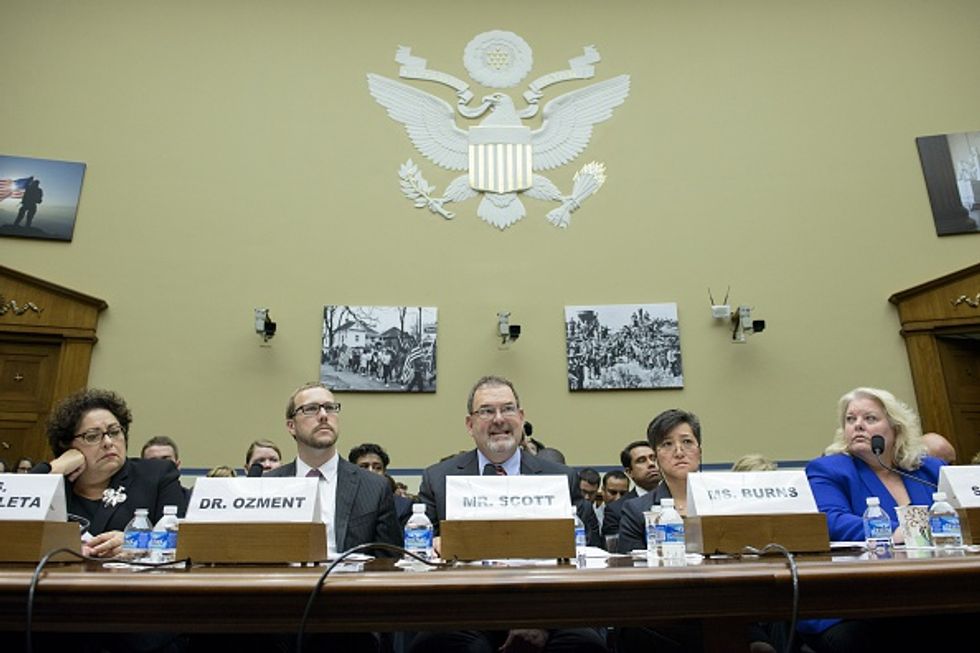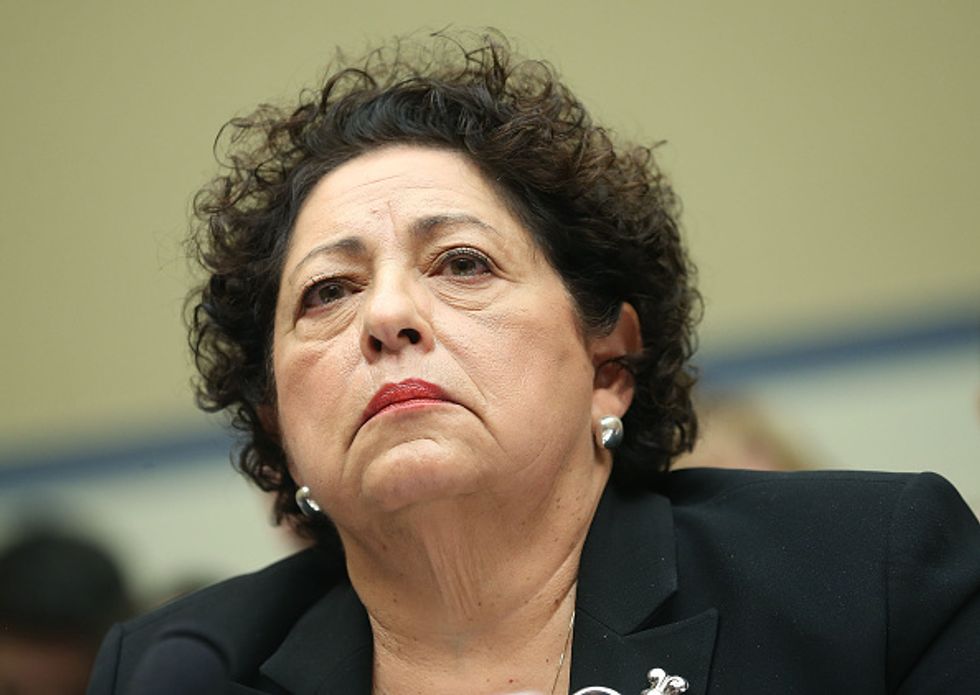
© 2025 Blaze Media LLC. All rights reserved.
Federal Officials Knew of Cybersecurity Issues Ahead of Massive Data Hack: 'They Recommended...That You Shut It Down and You Didn't
June 17, 2015
"You failed utterly and totally."
WASHINGTON (AP) — Years of fundamental cybersecurity lapses left the government's personnel agency wide open to a pair of hacks that have exposed the private information about nearly every federal employee, along with detailed personal histories of millions with security clearances, officials acknowledged to Congress.
Democrats and Republicans on the House Oversight and Government Reform Committee were united Tuesday in heaping scorn upon the leaders of the Office of Personnel Management, the agency whose data was breached last year in two massive cyberattacks only recently revealed.
"You failed utterly and totally," said the committee's chairman, Rep. Jason Chaffetz, a Utah Republican.

The criticism came from within, as well. Michael Esser, the agency's assistant inspector general for audit, told the committee of a years-long inability by OPM to meet federal cybersecurity standards. For a long time, he said, the people running the agency's information technology had no expertise. These shortcomings made the agency especially vulnerable to cyberattack, he said.
In November, an inspector general's audit recommended that the agency shut down some of its networks because they were so vulnerable, Esser testified. The director, Katherine Archuleta, declined, saying it would interfere with the agency's mission.
The hackers were already inside her networks, she later acknowledged.
"They recommended it was so bad that you shut it down and you didn't," Chaffetz said.
Archuleta, stumbling occasionally under withering questions from lawmakers, sought to defend her tenure and portray the agency's problems as decades in the making. She appeared to cast blame on her recent predecessors, one of whom, John Berry, is the U.S. ambassador to Australia.
Offered chances to apologize and resign, she declined to do either.

Chaffetz said the two breaches "may be the most devastating cyberattack in our nation's history," and said OPM's security policy was akin to leaving its doors and windows unlocked and expecting nothing to be stolen.
"I am as distressed as you are about how long these systems have gone neglected," Archuleta said, adding at another point, "The whole of government is responsible and it will take all of us to solve the issue."
Archuleta and the other witnesses offered few new details about the breaches in the public hearing, deferring most questions about methods and damage to a later, classified session.
After that session, Rep. Elijah Cummings of Maryland, the committee's ranking Democrat, demanded that the committee hear testimony from two OPM contractors, KeyPoint and USIS, that fell victim to hacks last year. Earlier, Cummings and other lawmakers questioned whether the OPM network was compromised first through hacking of the contractors, and OPM officials declined to answer.
During the open hearing, Donna Seymour, the agency's chief information officer, confirmed that personnel information on 4.2 million current and former federal employees had been stolen, not just accessed.
The number of security clearance holders whose data has been taken is not yet known, she said. But the records go back to 1985 and include contractors as well as federal employees. Some government officials estimate the number could be up to 14 million.
And because their security clearance applications contain personal information about friends and family, those people's data is vulnerable as well.
Seymour also disclosed that any federal employees who submitted service history records to OPM, whether or not their personnel records are kept by the agency, likely had their information stolen. That raised the specter that intelligence agency employees who were not kept in the main personnel system for security reasons may have been exposed anyway.
Another fear is that covert intelligence officers working undercover as government employees may have been made vulnerable. If their names are not in the federal employee database, that could be revealing to foreign adversaries; there also could be holes in any bogus employee record built for spying cover purposes.
Andy Ozment, a top Department of Homeland Security cyber official, said the hackers gained access to OPM's network using stolen credentials.
That was important because many lawmakers and outside experts had criticized OPM for failing to take the obvious step of encrypting sensitive data, including Social Security numbers. Ozment said attackers with network credentials could have accessed encrypted data, anyway.
Rep. Will Hurd, a Texas Republican and former covert CIA officer, said he didn't doubt the good intentions of the OPM witnesses, but "the execution has been horrific."
After the closed hearing, Hurd said it was clear to him that OPM's cyber security failures were a key factor in the success of the attack, and in failing to detect it for months.
China denies involvement in the cyberattack, and no evidence has been aired publicly proving Chinese involvement although the government says it has "moderate confidence" China was involved.
Lawmakers voiced fears Tuesday that China will seek to gain leverage over Americans with access to secrets by pressuring their overseas relatives and contacts, particularly if they happen to be living in China or another authoritarian country.
"China now has a list of Chinese citizens worldwide who are in close contact with American officials and they can use that for espionage purposes," said Rep. Ron DeSantis, a Florida Republican.
In the cyberattack targeting federal personnel records, hackers are believed to have obtained the Social Security numbers, birth dates, job actions and other private information on every federal employee and millions of former employees and contractors.
In the other attack, which the Obama administration acknowledged on Friday after downplaying the possibility for days, the cyber spies got detailed background information on millions of military, intelligence and other personnel who have been investigated for security clearances.
—
Front page image via Shutterstock.
Want to leave a tip?
We answer to you. Help keep our content free of advertisers and big tech censorship by leaving a tip today.
Want to join the conversation?
Already a subscriber?
more stories
Sign up for the Blaze newsletter
By signing up, you agree to our Privacy Policy and Terms of Use, and agree to receive content that may sometimes include advertisements. You may opt out at any time.
Related Content
© 2025 Blaze Media LLC. All rights reserved.
Get the stories that matter most delivered directly to your inbox.
By signing up, you agree to our Privacy Policy and Terms of Use, and agree to receive content that may sometimes include advertisements. You may opt out at any time.






